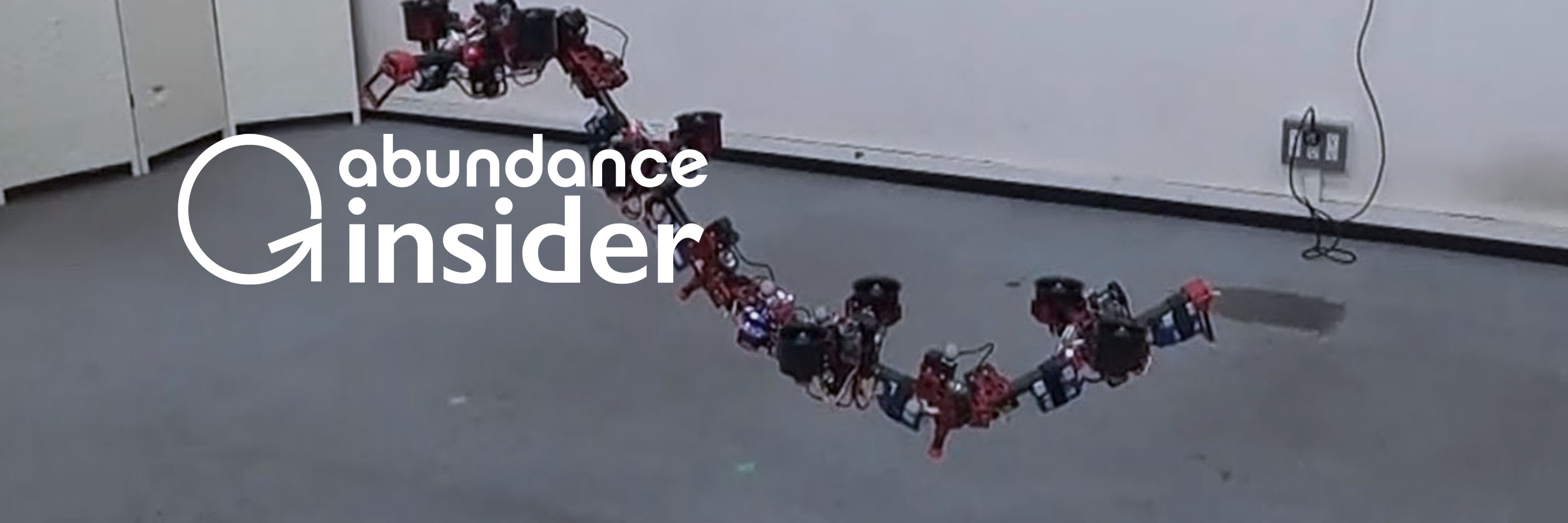
|
In this week's Abundance Insider: 3D printed cardiac patches, Tesla and PG&E's California Powerpack plans, and shape-shifting dragon drones. Cheers, P.S. Send any tips to our team by clicking here, and send your friends and family to this link to subscribe to Abundance Insider. Alibaba Launches Automated Robot Restaurant in Shanghai
What it is: At one of Alibaba’s high-tech Hema grocery stores, China’s e-commerce giant has launched its first automated dining experience. Enter Robot.He, a fresh seafood restaurant navigable with QR codes and served by robots. As you enter with Hema app in hand, a quick QR code scan shows you your table and automatically notes your seat in the system for Hema's robotic waiters. Head next to a fresh array of seafood and handpick your own ingredients, paid for in-app and carried to the kitchen via Hema’s in-store conveyor belt system. Why it's important: Alibaba’s Robot.He is only the beginning of a wave of companies transforming the restaurant experience with robotic servers and digitally streamlined dining. Just last month, Alibaba’s main rival JD.com announced that it will be launching 1,000 entirely robot-run restaurants by 2020, and U.S. restaurants like Creator and Spyce Kitchen are now riding the wave with their own meal-customizing robotic chefs. But while restaurant automation may seem threatening to traditional service jobs, it could also unlock myriad new roles in retail and service industries, allowing humans to do what we do best -- assisting and interacting with consumers, educating diners on cuisine -- and building out a broader experience economy. | Share on Facebook Spotted by Phillip Stutts / Written by Claire Adair Study: No Known Upper Limit to Human Longevity
What it is: An international team of scientists have come to the conclusion that there is no known limit to human lifespan. Published in the journal Science last week, the findings are based on a new set of high-quality data collected on Italians over the age of 105. While risk of death increases exponentially from age 65 to 80, the range of risk increases after 80 -- meaning that risks are more varied person to person -- and after age 105, overall risks seems to plateau at an average 50 percent of living another year. Why it's important: Even without the many advances we have made in recent years to save lives and extend healthy lifespans, this analysis suggests that mortality is not a foregone conclusion, as many might believe. Look for this to begin to turn public opinion, and for an increased acceptance of longevity research overall. | Share on Facebook Spotted by Marissa Brassfield / Written by Jason Goodwin Tesla and PG&E Announce Massive Powerpack Battery System for California
What it is: Tesla is well known for its bold entrance and disruption in the auto industry. Bleeding-edge battery technology, however, is at the core of Tesla's electric vehicle development and innovation. That battery technology has implications far beyond longer-range electric vehicles. Tesla and Pacific Gas & Electric are developing a massive 1.1 Gigawatt-hour battery storage bank in California -- enough to power hundreds of thousands of homes. If successful, this collaborative project would more than double the 1 Gigawatt-hour of battery storage already deployed by Tesla around the country. Why it's important: Disrupting an industry and driving exponential growth requires rethinking all aspects of an industry -- supply chain and strategic partnerships alike. One of the greatest barriers to transitioning to a fully renewable energy (namely solar and wind power) economy is our ability to store the energy that we harvest from these renewable sources. To date, battery costs have been enormous -- but they are plummeting, thanks to heavy investment and research and development from companies like Tesla. | Share on Facebook Spotted by Marissa Brassfield / Written by Max Goldberg Scientists 3D Print Human Cardiac Patch
What it is: Chicago startup Biolife4D just announced the successful 3D printing of a human cardiac patch, a major milestone in the quest to 3D bioprint fully functioning organs. According to CEO Steven Morris, the achievement is notable for two critical advancements: "First, it demonstrated Biolife4D’s ability to take a patient’s own blood cells, reprogram them back into stem cells, reprogram them again to make the different type of cells which we need to 3D bioengineer our human heart viable for transplant, and then successfully 3D bioprint with those cells to make living human heart tissue. Second, this is the first time that a cardiac patch was 3D bioprinted [with the] multiple cell types of which the human heart is made, includ[ing] preliminary vascularization." Why it's important: While this is just a piece of the goal of printing a human-scale heart replete with valves and blood vessels, printing with multiple cell types and vasculature simultaneously is a major breakthrough. Look for this methodology to lead to innovations in other organs such as the liver, and increased life expectancies in the very near future. | Share on Facebook Spotted by Skye Lininger / Written by Jason Goodwin Flying 'Dragon' Drone Can Change Shape in Midair
What it is: Researchers at the University of Tokyo have built a drone that can change shapes, and slither through the air like a snake. The drone is comprised of several small drones that can move with respect to each other, changing the shape of the overall drone. The system uses Artificial Intelligence technology to autonomously manipulate itself through narrow spaces. Each of the small drones propels itself with a fan that it can thrust-vector to change its direction on the fly. The entire drone runs on one battery, which can power the drone for three minutes of flight. Why it's important: Achieving autonomous flight of a complex system of several sources of thrust is extraordinary. Controlling vehicles is difficult enough, and programming vehicles to control themselves is a completely different challenge. Beyond the impressive control system, this drone architecture will have some practical applications once it’s further developed. Imagine a flying AI-powered robot to help you around the house. We will also see interesting applications of these flexible drones in industries like insurance and infrastructure maintenance. | Share on Facebook Spotted by Marissa Brassfield / Written by Max Goldberg Why China is Spending Billions to Turbocharge its Economy With Robots
What it is: The world's largest manufacturing economy, China produces about one-fourth of all global goods. But as rising wages and an aging population cut into company profits, President Xi has called for a robot revolution in manufacturing. Driven by the state’s Made in China 2025 campaign -- an ambitious plan to lead in areas like automation, microchips and self-driving vehicles -- China deployed 87,000 industrial robots in 2016, and this growth is predicted to surpass 20 percent year-on-year through 2020. As companies like Foxconn aim for 30 percent automation by 2020 with full-time “Foxbots,” others like Geekplus Robotics have joined the 3,000+ robot manufacturers launched with generous government funding and local policy support. Why it's important: China’s tremendous government push in robotics is only one of the many tech initiatives on Beijing’s agenda. And as Chinese companies find it increasingly difficult to compete on cheap labor, local government officials and private sector players are more than matching Beijing’s efforts, slashing hundreds of thousands of jobs and pouring in tens of millions (USD) in funding for everything from robot-operated warehouses to automated cake companies. But while some fear mass unemployment and growing wage gaps, almost two-thirds of Chinese survey respondents seem optimistic about AI’s impact on their lives. Already planning ahead for the automated age, China’s Ministry of Education has unveiled plans to enroll 23.5 million students in 3-year vocational programs by 2020, targeting 21st century skills and new economic opportunities. | Share on Facebook Spotted by Morgan McDermott / Written by Claire Adair What is Abundance Insider? This email is a briefing of the week's most compelling, abundance-enabling tech developments, curated by Marissa Brassfield in preparation for Abundance 360. Read more about A360 below. Want more conversations like this?At Abundance 360, Peter's 360-person executive mastermind, we teach the metatrends, implications and unfair advantages for entrepreneurs enabled by breakthroughs like those featured above. We're looking for CEOs and entrepreneurs who want to change the world. The program is highly selective. If you'd like to be considered, apply here. Know someone who would benefit from getting Abundance Insider? Send them to this link to sign up. |
Topics: Abundance Insider 3D Printing AI Artificial Intellegence robots Alibaba Drones Tesla Batteries Autonomous Drones













